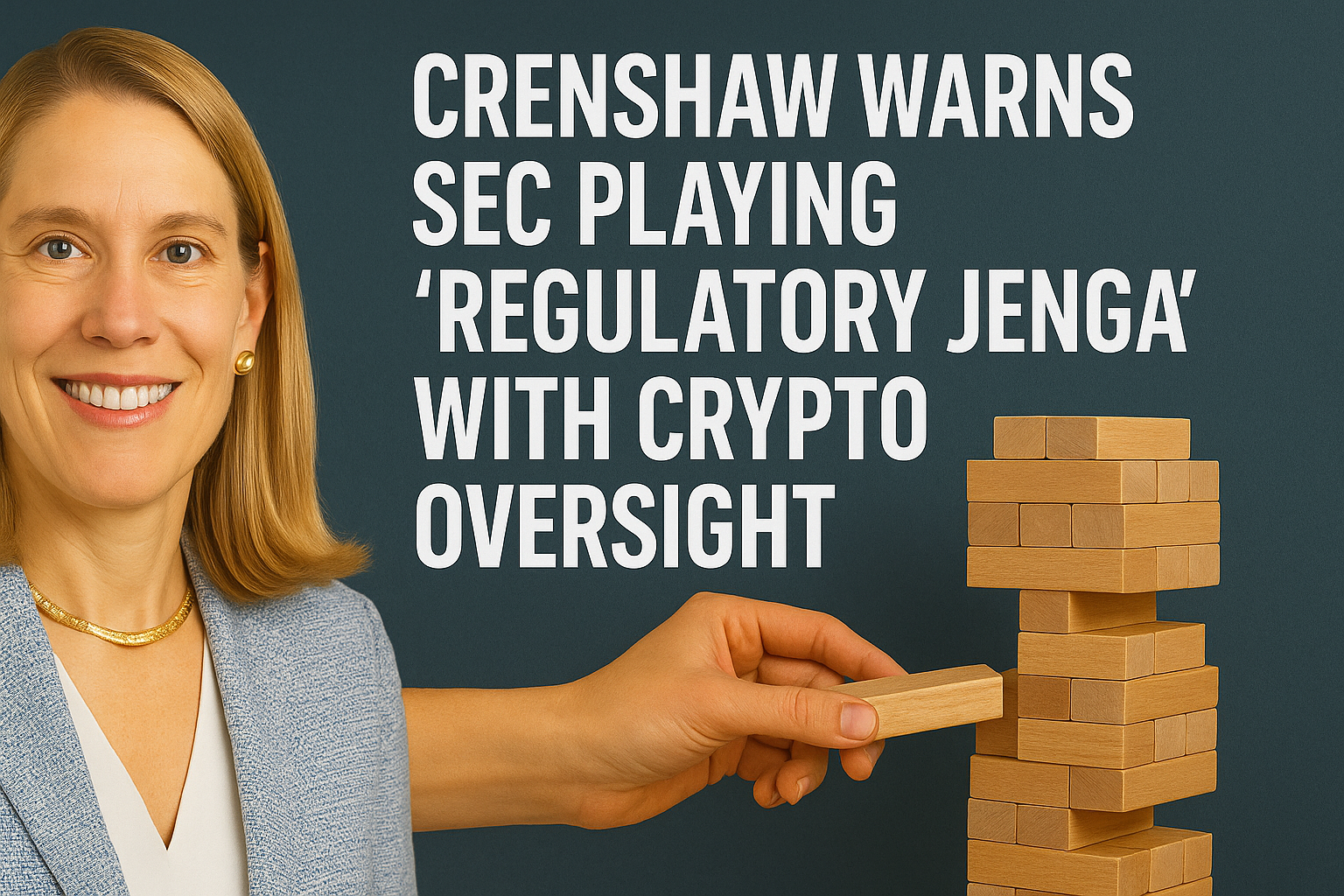
Crenshaw’s “Regulatory Jenga” Warning
In a striking critique delivered at the SEC Speaks event on May 19, SEC Commissioner Caroline Crenshaw described the agency’s recent approach to crypto oversight as “regulatory Jenga.” The agency’s sole Democratic commissioner said the SEC’s apparent retreat from key enforcement practices — particularly around the cryptocurrency industry — poses a serious risk to market stability and the agency’s legal standing.
Crenshaw likened the current deregulatory trajectory to removing blocks from a carefully constructed Jenga tower — suggesting that unraveling long-standing, interrelated rules could lead to structural collapse.
“Our statements on these crypto-related issues are the equivalent of a wink and nod intended to convey that we do not plan to rigorously apply our laws.” — Commissioner Crenshaw
According to Crenshaw, this shift represents not just a change in policy but a dangerous “about-face” that has the potential to corrode institutional credibility and destabilize markets.
Reversing Rules Without Input
Crenshaw criticized the SEC for using informal staff guidance to reverse prior rule interpretations without rigorous analysis or public comment. This, she said, was particularly evident in its dealings with crypto-related issues.
“The Commission’s abandonment of swaths of our enforcement program deeply troubles me.”
She pointed to a broader trend of deregulation, where critical regulatory safeguards are being stripped away without due process. The move toward “regulation by non-enforcement” has left gaps in oversight — especially concerning given the volatility and complexity of crypto markets.
The commissioner also drew attention to significant staff losses at the agency, which have compounded the issue and left enforcement efforts weakened.
FTX Collapse a Stark Reminder
Crenshaw invoked the 2022 collapse of crypto exchange FTX as a reminder of the systemic risks posed by poorly regulated crypto markets. She emphasized that the threats that led to that failure have not disappeared — but regulatory vigilance has waned.
“Those risks have not gone away, but the calls for serious regulatory scrutiny are a lot quieter these days.”
She argued that as crypto continues to intersect with traditional financial systems, a lack of robust oversight could lead to another crisis with “high stakes and hard lessons.”
The commissioner, who also opposed the SEC’s settlement with Ripple, expressed concern that scaling back enforcement sends a dangerous signal to the markets and emboldens bad actors.
Republican Commissioners Disagree
In contrast to Crenshaw’s warnings, Republican SEC commissioners expressed support for the agency’s more permissive crypto stance. Commissioner Paul Atkins said crypto markets had long been “languishing in SEC limbo,” and praised the agency for stepping back from heavy-handed oversight.
“Crypto markets have been languishing in SEC limbo for years.” — Paul Atkins
Commissioner Hester Peirce, head of the SEC’s Crypto Task Force, argued that most current crypto assets are no longer securities, even if they originated as such. She criticized the previous administration’s handling of crypto regulation, calling for a return to “sound regulatory practice.”
“Even if initially sold under investment contracts, many crypto assets are now clearly functional and outside securities laws.” — Hester Peirce
Commissioner Mark Uyeda echoed the sentiment, stating that regulation by enforcement should not be used as a policymaking tool and called for more transparent, proactive regulatory guidance.
Conclusion: A Divided Commission
The divergent perspectives among SEC commissioners reveal a sharp split in how the agency views its role in regulating crypto. On one side, Crenshaw warns that dismantling crypto regulations could topple the entire structure of market oversight — like a fragile Jenga tower. On the other, Republican commissioners advocate for a more innovation-friendly, hands-off approach.
The future of crypto regulation in the U.S. hangs in the balance, as the SEC grapples with how to define — and enforce — the rules of an evolving financial frontier.
“Failing to appreciate and address these risks and complexities destinies us to repeat hard lessons with high stakes.” — Caroline Crenshaw

